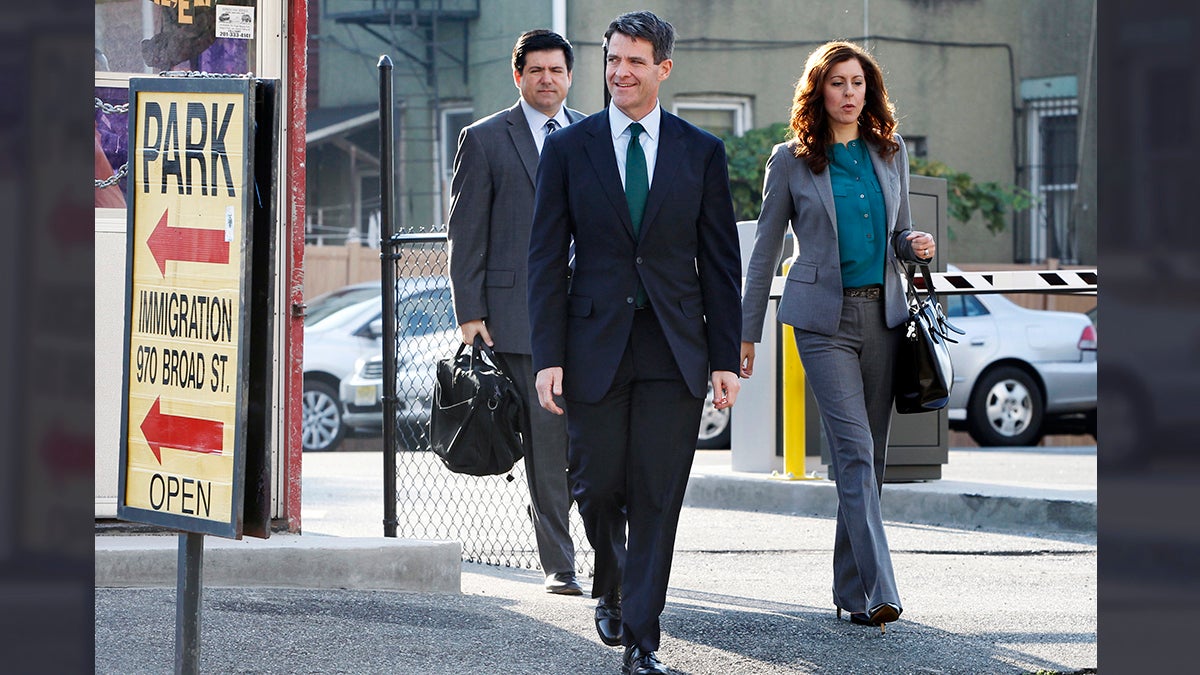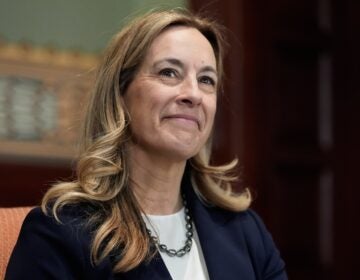Baroni on Bridgegate role: ‘I didn’t do the job I should’ve done’
Listen
Bill Baroni (center) walks with his attorneys Jennifer Mara and Michael Baldassare toward the federal courthouse in Newark
Facing a barrage of pointed questions in federal court Tuesday, former Port Authority of New York and New Jersey executive Bill Baroni said he regretted his role in politically motivated lane closures at the George Washington Bridge in 2013. But he said that he acted in good faith.
“I didn’t do the job I should’ve done,” Baroni testified. “I should’ve listened to my instincts.”
He said that he did not respond to calls for help from Fort Lee Mayor Mark Sokolich during the four days of traffic jams because fellow Port Authority official David Wildstein told him it would compromise the traffic study, which was the cover story drummed up to obscure the political motivation behind the lane closures.
Baroni also claimed that he did not testify about the political reason for the closures before the state Assembly Transportation Committee because Wildstein had kept the true motive for the scheme secret. Wildstein “hadn’t told me the truth,” Baroni said.
Prosecutors contend that officials at the Port Authority and aides in the office of Gov. Chris Christie, a Republican, deliberately caused traffic jams in Fort Lee to punish Sokolich, a Democrat, for not endorsing Christie for re-election.
Wildstein has pleaded guilty in the scheme and has already testified at the trial of Baronia and former Christie aide Bridget Anne Kelly.
But Assistant U.S. Attorney Lee Cortes aggressively questioned Baroni’s characterization of his role in the scheme as an unknowing fall guy.
“You did nothing to help [Sokolich], did you?” Cortes said at one point. Later, in reference to Baroni’s testimony before state lawmakers, Cortes asked, “Didn’t you lie to them repeatedly, sir … because you wanted to get away with it?”
(During one rapid-fire exchange, Baroni replied to a question while Cortes was still speaking. “Let me finish my questions before you start answering, Mr. Baroni,” Cortes responded. “I’d appreciate it.”)
Baroni’s testimony contradicted what Wildstein had said earlier in the trial — that Baroni knew about the political reasons behind the lane closures and helped cover them up.
Cortes reinforced that idea by suggesting that Baroni was a member of Christie’s inner circle, despite Baroni’s claims that administration officials had distanced themselves from him.
For example, Cortes asked about a phone call in which Christie ordered Baroni to tell firefighter Bill Lavin to “go F yourself.” Baroni said he did so, reluctantly.
Another time, Cortes said, Christie praised Baroni for publicly berating the late U.S. Sen. Frank Lautenberg, a Democrat, for criticizing bridge toll increases despite having had a free E-ZPass account as a former Port Authority commissioner.
Baroni said being the aggressive advocate for the Christie administration was never his strong suit — “I don’t like being an attack dog” — and that it was Wildstein’s job.
Testimony also focused on Baroni’s relationship with Wildstein. Cortes showed joking text messages between the two men, displayed a photograph of Baroni at Wildstein’s son’s bar mitzvah, and brought up the fact that Wildstein helped Baroni campaign door-to-door when Baroni was running for state office. (“He sat in the car,” Baroni said.)
Wildstein had testified that Baroni had been one of his best friends, a claim that Baroni denied.
“David Wildstein and I have a very different definition of friendship, because I don’t view a friend as someone who would lie to me over and over and over,” Baroni said.
WHYY is your source for fact-based, in-depth journalism and information. As a nonprofit organization, we rely on financial support from readers like you. Please give today.




